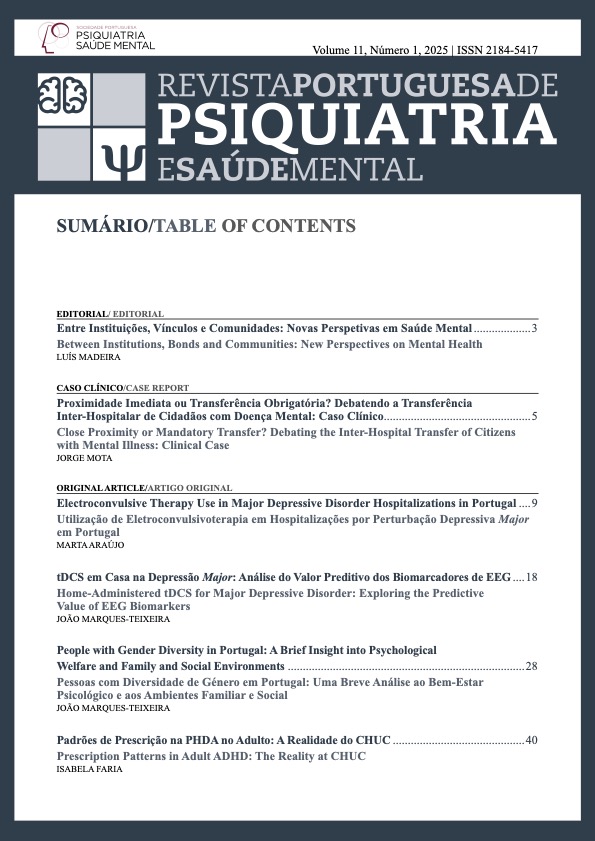People with Gender Diversity in Portugal: A Brief Insight into Psychological Welfare and Family and Social Environments
DOI:
https://doi.org/10.51338/rppsm.555Keywords:
Transgender Persons, Gender Identity, Sexual and Gender Minorities, Gender Dysphoria, Mental HealthAbstract
Introduction: Transgender people experience many life challenges, often by relatives or peers, which can lead to multiple mental health issues.Methods: Given the described family and social challenges in people with gender diversity and their impact on mental welfare, the need for a brief description of these settings arose. Being so, an original questionnaire was constructed and, afterwards, provided to different healthcare professionals and organizations who contact with transgender people. Subsequently, these partners applied the questionnaire to people who met the following criteria: self ‑identifying as a transgender person, being 18 years old or older and residing in Portugal. This was done to try to encompass as many adult transgender people as possible who may contact Portuguese health services and have a broad notion of their family, social and psychological background. By having a general comprehension of these matters, we hope to inform the clinical community, impact clinical assessment and promote an empathic relationship with the patient.
Results: Regarding tolerance towards gender diversity, we found that it increased substantially from childhood and adolescence to current life; also, we ascertained that, when the trans person’s household is not tolerant, neither are the peers, and vice ‑versa (p=0.023). As for the topics of gender and sexuality, we found a gap between the amount of trans youth who think about these topics and the amount of households, peers or schools who approach them. In regards to mental health, we found that anxiety, depression and suicidal issues remain significantly present among trans people; however, a non ‑binary gender identity may be a protective mental health factor.
Conclusion: Mental health challenges remain prevalent within trans people, whether they are feelings of anxiety, depression, suicidal issues, family or social struggles. This paper wishes to raise awareness of these struggles to promote a better healthcare professional–patient relationship. We also wish to impact clinical practice, namely to do an early distinction between a case of gender diversity or gender dysphoria, identify potential therapeutic targets and goals and to help formulate a therapeutic plan together with the patient.
Downloads
References
American Psychiatric Association. DSM-5 Task Force. Diagnostic and Statistical Manual of Mental Disorders: DSM-5. Chicago: APA; 2013.
Tangpricha V, Safer JD. Transgender women: Evaluation and management.
Tangpricha V, Safer JD. Transgender Men: Evaluation and Management.
Forcier M, Olson-Kennedy J. Gender Development and Clinical Presentation of Gender Diversity in Children and Adolescents.
World Health Organization. Defining Sexual Health. Geneva: WHO; 2006.
World Health Organization. Gender and Health.
Coleman E, Radix AE, Bouman WP, Brown GR, de Vries AL, Deutsch MB, et al. Standards of Care for the Health of Transgender and Gender Diverse People, Version 8. Int J Transgend Health. 2022;23:S1-S259.
Collin L, Reisner SL, Tangpricha V, Goodman M. Prevalence of transgender depends on the "case" definition: a systematic review. J Sex Med. 2016;13:613-26.
Johns MM, Lowry R, Andrzejewski J, Barrios LC, Demissie Z, McManus T, et al. Transgender Identity and Experiences of Violence Victimization, Substance Use, Suicide Risk, and Sexual Risk Behaviors Among High School Students - 19 States and Large Urban School Districts, 2017. MMWR Morb Mortal Wkly Rep. 2019;68:67-71.
Winter S, Diamond M, Green J, Karasic D, Reed T, Whittle S, et al. Transgender people: health at the margins of society. Lancet. 2016;388:390-400.
Portugal. Lei no 38-2018.
Olson J, Forbes C, Belzer M. Management of the transgender adolescent. Arch Pediatr Adolesc Med. 2011;165:171-6.
Hoxmeier JC, Madlem M. Discrimination and interpersonal violence: reported experiences of trans* undergraduate students. Violence Gend. 2018;5:12-8.
Ellis SK. Accelerating Acceptance 2021.
ILGA Portugal. Relatorio Anual 2019 - Discriminação Contra Pessoas LGBTI+ 2020.
Rodrigues J, Lemos C, Figueiredo Z. Discriminação e Barreiras ao Acesso ao Serviço Nacional de Saúde Percecionados por Pessoas Trans. Rev Port Psiquiatria Saúde Mental. 2020;6:98-108.
Grossman AH, D’Augelli AR. Transgender Youth and Life-Threatening Behaviors. Suicide Life Threat Behav. 2007;37:527-37.
República Portuguesa. Taxa de desemprego em janeiro é a mais baixa dos últimos 20 anos.








